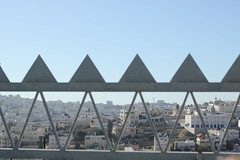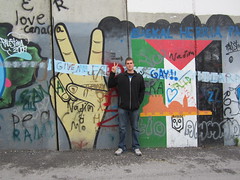I have often observed cultures from the perspective of a foreigner, either as one or from the mind of one. My life has been characterized by movement, both permanent and temporary. My roots grow not from living in one land but through relationships and experiences. Being removed from homes I love brings sadness and fear, yet also a new energy and exhilaration to pursue novel unknowns. It is difficult for me to imagine fighting or dying for a patch of land. I am on a pursuit for answers, while still understanding the Palestinians’ desire for freedom.
One of the experiences that has impacted me the most so far is our group visit to the Wall. This zigzag Wall protrudes from the street in dark gray cement slabs littered with graffiti professing its injustice and prophesying its demise. It looks so opposite to its surroundings that few can miss the fact that the Wall wasn’t always present. It cuts the road in half and carves around the Palestinian buildings, choosing its path for the purpose of “securing” Israeli interests. I put my hand out to touch the Wall as I walked along it gazing up at the top nine meters above and searching the clouded windows of military towers for a sign of humanity within. I felt the lifeless cold and greed that brought this Wall into being. The hurt and claustrophobia emanated from this town’s eyesore making my heart cry, and wonder how this could have happened or been allowed. It is hard to comprehend what seems like hate, but the ultimate cause, I believe, is Fear. One of my teachers at EMU once said that the opposite of love is not hate but fear. The more I explore the world, the more this becomes true to me. Why would you fight for power if you did not fear losing control or insecurity or even pain?
In Hebron, settlements and Palestinian communities dwell side by side in the center of town, creating an unusual circumstance compared to other cities. Fear exists as a strong psychological barrier that feeds the physical features of the city. It is visible in the automatic guns carried by many settlers walking on a street that forbids Palestinian travel. It is demonstrated in the tension of Palestinians waiting to pass through checkpoints at the mercy of the soldiers’ good will not to harass them. Makeshift ladders and stairs dot the roofs of Palestinian homes beside a wall, as the only method of access to the outside world with front doors blocked off. Soldiers patrol a cemetery above a military outpost for suspicious activity as legislation prepares plans for making it a road to ease travel between settlement homes. A settler we talked to avoids any sections of town where Palestinians live because it is considered by soldiers to be too dangerous. Wired mesh serves as protection against the shelling of undesirable missiles in the form of water, eggs, or rocks that settler hands drop on passersby in Palestinian alleys below.
method of access to the outside world with front doors blocked off. Soldiers patrol a cemetery above a military outpost for suspicious activity as legislation prepares plans for making it a road to ease travel between settlement homes. A settler we talked to avoids any sections of town where Palestinians live because it is considered by soldiers to be too dangerous. Wired mesh serves as protection against the shelling of undesirable missiles in the form of water, eggs, or rocks that settler hands drop on passersby in Palestinian alleys below.
I observe barriers constructed everywhere I go, from years of unresolved stalemate. I have seen so much injustice that I was beginning to become discouraged a few days ago. Two experiences I have spotted involving faith raise my Spirit. It is amazing to view how this situation has strengthened religious commonalities among the Palestinians. The Palestinian Christians also struggle against their denominational divisions but most reach out with “Loving Resistance” under the Kairos document. The next experience, the Tent of Nations, stands up against the suffocating settlements on the mountain tops encircling it. The man who owns the land works on cultivating the land in self-sufficient ways. He must constantly and creatively dodge the restrictions thrown in his path to retain his land. He is inspiring because he must find alternatives to procure water, electricity, and methods of construction for his dwellings that could survive demolition. Every day he lives in faith that he will keep his land. One lecturer told us earlier this week that with reasons surrounding you to break and pursue you, you (Palestinians) stay here by faith believing that God has put you here for a reason.
Our faith and actions of love I believe can demolish any barrier and bring hope to this land of discord. “And now these three remain: faith, hope, and love. But the greatest of these is love” (1 Corinthians 13: 13).
-Crystal Lehman
The Thaw
Sounds dim to a lonely hum of an electric heater
Flashing, blinking lights quiet to a steady white light
Moving objects, moving minds come to a stop
Quiet
I can feel the place I stand
Flashing, spinning memories ease into a bird chirping in a tree
Warmth tingles my numb fingers and toes
Slowly, ever slowly, the ice begins to soften and drip
The first three weeks of our time in the Middle East reminds me of early morning polar bear swims at camp. You run into the water full speed, flail around, screaming and laughing, then run out of the water and sit on the beach completely numb.
Now that we are in Palestine, in a home, we finally have time to sit and let the sun thaw our numbed souls. The thawing process aches a bit. We can feel the Palestinian hurt of the occupation, humiliation of inequality, and longing for their and our own homeland(s). But regaining feeling means we can also feel the joy of Palestine! The joy of celebrations with family, incredible food, meeting inspiring people working for peace, being able to order falafel in Arabic, or simply listening to a bird chirp in a lemon tree as the sun rises.
The Middle East is a place where pain and peace, sadness and joy, past and present, mourning and celebration all exist at once in an incredible balance that I hope to one day understand and embody.
-Laura Bowman
